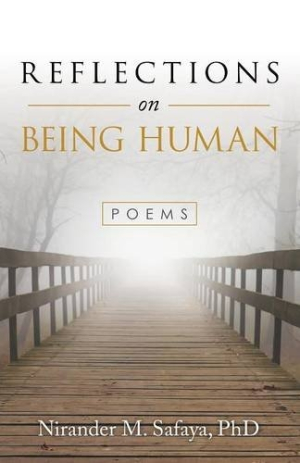Reflections on Being Human
Reflections on Being Human works toward truth and self-actualization, with many poems hinting at ultimate, perfect unity.
Nirander Safaya’s extensive collection of poetry, Reflections on Being Human, covers subjects from the immediate to the divine, with plenty of meditations on the natural world given along the way. Strong narrative tendencies and surprising imagery make this collection a frequent surprise.
Safaya’s 152 poems are divided into three sections, if poems in each sometimes seem to fit multiple categories: life, love, and light are their foci. The life section focuses most on the natural world, while the one on love devotes a great deal of time to examining, and lamenting, one deteriorating relationship. The last section, on light, focuses on religious themes and holds some of the book’s strongest pieces.
A commitment to end rhyming results in frequent awkwardness and leaves many poems wanting for a sense of authenticity, though it sometimes also leads to playfulness, as with “singing in symphonia” to match “Olympia” in the line above. More often, it leads to mismatched wording and odd sentence structures, which interrupt the flow of the work. Some of the collection’s strongest poems don’t commit to rhyme schemes this way, while others choose shapely forms over rhymes to happy effect, as with “The Path,” which, though it cheats some midway by reducing “through” to “thru,” is thoughtful and moving.
The few narrative poems in the collection that don’t focus on its central relationship prove to be high points, especially the heartbreaking “Orphan Girl,” which focuses on a child in a shell-shocked town dancing for change and ends on a horrifying, evocative note. Colorful imagery and a sympathetic tone make that moment powerful. Less affecting are the poems dedicated to the collapsing relationship that run through the middle section, which, taken out of chronological order as they are, make the journey from infidelity to dissolution seem exaggerated in its tumult, and end up being less than sympathetic. Some poems seem to be in such a rush to make a big point that they switch streams in last stanzas, as with a poem that points to Wall Street corruption at its end, though its primary focus had been on what’s left over when love is gone.
Much of the collection’s imagery is beautiful, if sometimes repetitive, with nature frequently receiving feminizing treatment; damsels and maidens factor in to the first section in an overwhelming way. Some images are odd, either mismatched or intentionally strange: the “ebony glow” of the moon, “sweetly killing,” and “gently heaves” all require a pause. Other images have staying power: slippers that carry the scent of the roses they bruised are a sensory delight. The last section, which focuses on the ultimate, incorporates multiple world religions into a dazzling and reflective mix; its “Atman” warrants rereading, and utilizes previous natural imagery to uncommon and timeless effect:
I am the song, the singer, and the listener,
The melody flowing forth…
I am the voice of silence, as one can tell.
From this considerable array, there are many poems from which to draw grand and lovely concepts, and these are worth the work that sifting through repetition and uneven form sometimes requires. “Undoing” may hint at the best means of enjoying so wide a collection: “let us rejoin in one perfect rhyme / the scattered words of our poem.” Reflections on Being Human works toward truth and self-actualization, and while not all paths provide enlightenment, many do hint at ultimate, perfect unity.
Reviewed by
Michelle Anne Schingler
Disclosure: This article is not an endorsement, but a review. The publisher of this book provided free copies of the book and paid a small fee to have their book reviewed by a professional reviewer. Foreword Reviews and Clarion Reviews make no guarantee that the publisher will receive a positive review. Foreword Magazine, Inc. is disclosing this in accordance with the Federal Trade Commission’s 16 CFR, Part 255.

